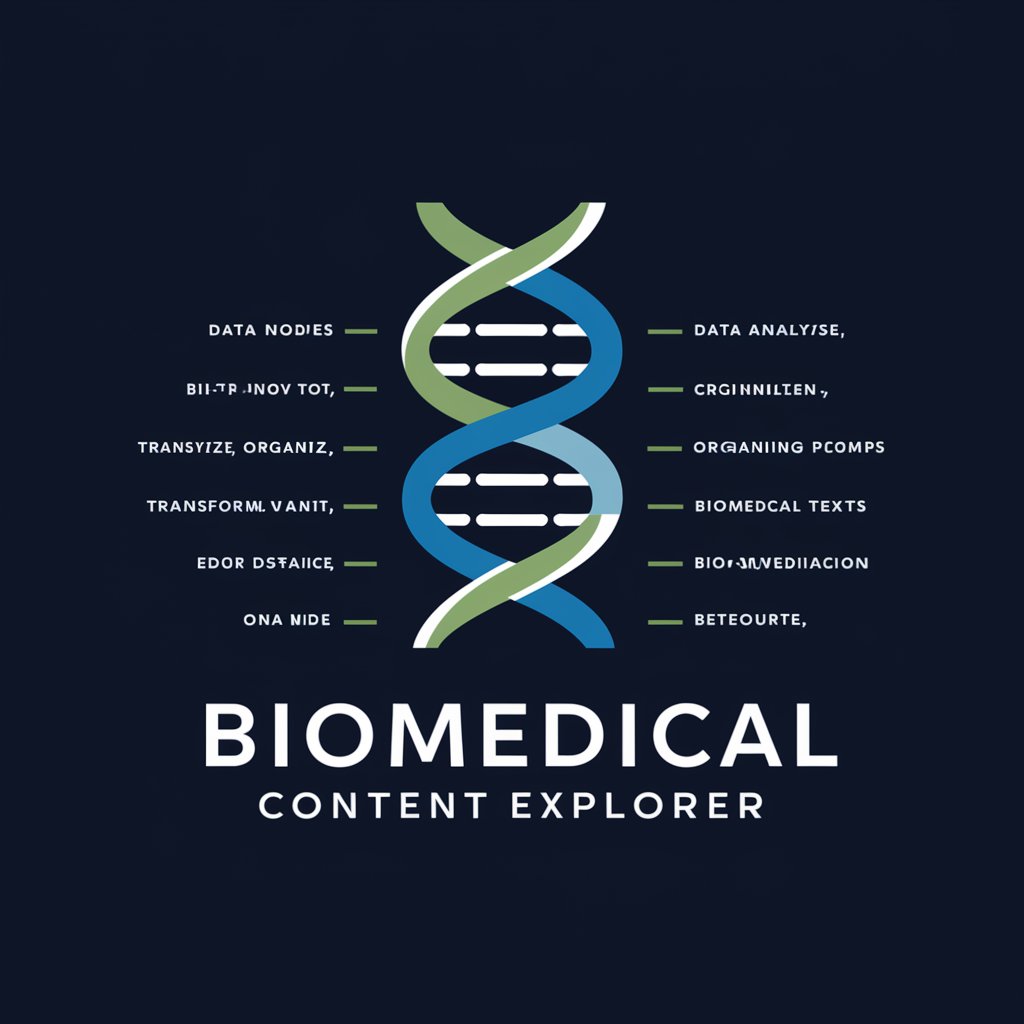5 GPTs for Clinical Studies Powered by AI for Free of 2026
AI GPTs for Clinical Studies refer to advanced artificial intelligence tools based on the Generative Pre-trained Transformer (GPT) model, specifically tailored for the clinical studies sector. These tools are designed to analyze, interpret, and generate text based on vast amounts of medical literature, clinical trial data, and research papers. Their role is crucial in synthesizing and extracting valuable insights from complex datasets, aiding in the development of new treatments, and enhancing the efficiency of clinical trials. By leveraging natural language processing and machine learning, AI GPTs offer bespoke solutions that cater to the nuanced needs of clinical research, from patient data analysis to drafting research papers.
Top 5 GPTs for Clinical Studies are: Biomedical Content Explorer,hearing aid researcher,The ageing epigenome and its rejuvenation,BioMed Wizard,Academic PI
Biomedical Content Explorer
AI-powered Biomedical Text Analysis

hearing aid researcher
Empowering auditory research with AI-driven insights

The ageing epigenome and its rejuvenation
Revitalize aging cells with AI-powered epigenetic insights

BioMed Wizard
Empowering research with AI precision

Academic PI
Empowering research with AI-driven insights
Key Attributes and Capabilities
AI GPTs for Clinical Studies boast a range of unique features tailored to the clinical research domain. These include advanced data analysis for patient outcomes, side effects, and statistical significance in trials. They adapt from basic information synthesis to creating complex meta-analyses and systematic reviews. Special features include language learning for interpreting medical jargon, technical support for integrating with clinical databases, web searching for the latest studies, image creation for illustrating medical concepts, and custom data analysis scripts to support evidence-based conclusions.
Intended Users of Clinical Study AI Tools
The primary users of AI GPTs for Clinical Studies include healthcare professionals, clinical researchers, medical writers, and pharmaceutical developers. These tools are accessible to novices in data science, providing a user-friendly interface for complex data analysis and report generation. Simultaneously, they offer extensive customization options for developers and professionals with programming expertise, enabling the development of tailored applications for specific research needs.
Try Our other AI GPTs tools for Free
Biomaterial Research
Explore the revolutionary impact of AI GPTs in Biomaterial Research, unlocking new potentials in material science with advanced data analysis and predictive modeling capabilities.
Disease Regeneration
Discover AI GPTs for Disease Regeneration, the cutting-edge tools transforming regenerative medicine with advanced AI, tailored solutions, and accessible insights for all.
Caption Crafting
Discover how AI GPTs for Caption Crafting automate and refine content creation with intelligent, context-aware captions for all types of media, making them essential for digital professionals.
Comment Management
Discover how AI GPTs for Comment Management revolutionize online interactions, offering efficient moderation, personalized engagement, and insights into community sentiment.
Points Redemption
Discover AI-powered GPT tools for Points Redemption, enhancing loyalty programs with personalized, intelligent solutions for optimizing reward strategies and customer engagement.
Link Discovery
Discover how AI GPTs for Link Discovery revolutionize finding and analyzing online links with advanced machine learning, tailored to novices and professionals alike.
Further Perspectives on Clinical Research AI
AI GPTs function as customizable solutions across various sectors, particularly in clinical studies, where they offer a user-friendly interface and flexibility. Their ability to integrate with existing systems and workflows significantly enhances research productivity and insight generation, making them indispensable tools in the fast-evolving field of clinical research.
Frequently Asked Questions
What are AI GPTs for Clinical Studies?
AI GPTs for Clinical Studies are specialized AI tools designed to support clinical research by analyzing and generating text from medical data and literature.
How can AI GPTs enhance clinical research?
They streamline data analysis, improve the accuracy of findings, and facilitate the creation of comprehensive research documents, thereby enhancing the efficiency of clinical trials.
Who can benefit from using AI GPTs in clinical studies?
Healthcare professionals, clinical researchers, medical writers, and pharmaceutical companies are among the key beneficiaries.
Do I need coding skills to use AI GPTs for Clinical Studies?
No, these tools are designed to be user-friendly for those without coding skills, though they also offer customization options for those with programming expertise.
Can AI GPTs for Clinical Studies integrate with existing databases?
Yes, many of these tools offer technical support for integrating with existing clinical databases and research platforms.
How do AI GPTs manage complex medical terminology?
Through advanced language learning algorithms, they are adept at interpreting and generating text with complex medical jargon accurately.
Can these tools create images for medical concepts?
Yes, some AI GPTs come with image creation capabilities to illustrate medical concepts and data visually.
Are AI GPTs for Clinical Studies customizable for specific research projects?
Absolutely, they offer extensive customization options to tailor the tool's functions to meet the specific needs of various clinical research projects.